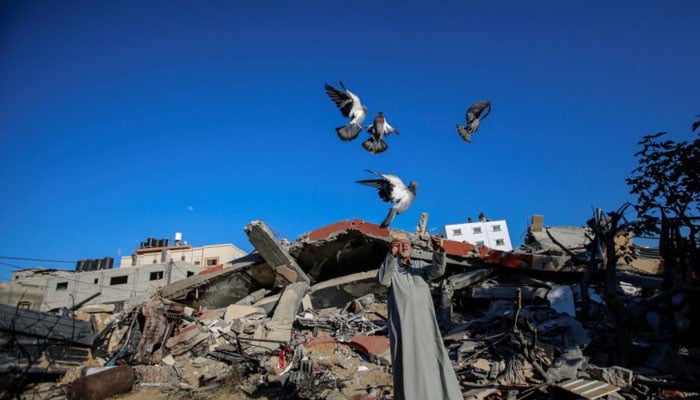Day of rights
Amnesty International terms atrocities in Gaza genocide, yet no strong nation has stepped forward to halt them
Today, as world leaders deliver grand speeches to commemorate Human Rights Day, they will pledge allegiance to the principles of dignity, freedom, and equality outlined in the Universal Declaration of Human Rights (UDHR). Yet, their lofty words will ring hollow against the grim realities of a world that routinely betrays these values. Nowhere is this betrayal more glaring than in Gaza, where more than 400 days of violence and destruction have unfolded under the world's watchful and indifferent eye. Amnesty International has termed the atrocities in Gaza a genocide, yet no powerful nation has stepped forward to halt the slaughter. This indifference reveals a devastating truth: international solidarity is a myth when it comes to marginalised people or regions. And, until we confront the systemic failures that allow such horrors to persist, these commemorations remain empty gestures.
But the shame of failing human rights is not limited to global powers. Pakistan’s record is equally dismal. Ranked 133 out of 180 countries by Freedom House in 2023, Pakistan remains a nation where human rights are often seen as privileges for a select few. The past year has witnessed unrelenting violence against religious minorities, suppression of political dissent, and the continued suffering of women, who remain vulnerable to systemic neglect and abuse. Draconian practices, such as detaining family members of fugitives to exert pressure, remain entrenched, while enforced disappearances haunt the country. The media, far from being a free pillar of democracy, is frequently targeted, silencing voices that dare to critique the powerful. Meanwhile, the plight of marginalised groups is often met with apathy.
The tragic loss of lives in stampedes at ration centres underscores the dire state of social welfare, while horrifying incidents, such as children beaten to death for minor mistakes in domestic servitude, highlight the pervasive dehumanisation of vulnerable groups. These are not just failures of governance but also a reflection of a society where intolerance thrives and human rights are subordinated to personal biases and systemic inequities. Change must come from both state and society. Policymakers must prioritise the protection of all citizens, regardless of their background, and address the root causes of economic and social disparities. Basic amenities – clean water, gas, electricity, security – should be guaranteed to every citizen, not hoarded by the privileged few. Political leaders must abandon their self-serving rivalries and work towards building a society where dignity and equality are non-negotiable rights, not lofty ideals. Human rights are the foundation of humanity’s survival. On this Human Rights Day, let us commit to more than words.
-
 King Charles Takes A Major Step To Keep Horrified Prince William Out Of The Loop On Andrew: Insider
King Charles Takes A Major Step To Keep Horrified Prince William Out Of The Loop On Andrew: Insider -
 Taylor Swift Set To Make Biggest Cut From Her Wedding Guest: Blake Lively Or Ryan Reynolds
Taylor Swift Set To Make Biggest Cut From Her Wedding Guest: Blake Lively Or Ryan Reynolds -
 Prince William Meets Saudi Crown Prince Mohammed Bin Salman
Prince William Meets Saudi Crown Prince Mohammed Bin Salman -
 Brooklyn Beckham Brutally Cuts Off Inner Circle Amid Feud With David, Victoria
Brooklyn Beckham Brutally Cuts Off Inner Circle Amid Feud With David, Victoria -
 Kaley Cuoco Reveals Why Fiance Tom Pelphrey Sleeps In Seperate Room
Kaley Cuoco Reveals Why Fiance Tom Pelphrey Sleeps In Seperate Room -
 Ghislaine Maxwell Will Not Answer Congress Questions On Epstein
Ghislaine Maxwell Will Not Answer Congress Questions On Epstein -
 Kensington Palace Announces Prince William's Arrival In Saudi Arabia
Kensington Palace Announces Prince William's Arrival In Saudi Arabia -
 ‘Andrew Crisis Follows King Charles Everywhere Now’
‘Andrew Crisis Follows King Charles Everywhere Now’ -
 Jennifer Aniston Already Decided Her Wedding Dress?
Jennifer Aniston Already Decided Her Wedding Dress? -
 Prince Harry, Meghan’s Hollywood Party Drama Exposes Chaotic PR Strategy
Prince Harry, Meghan’s Hollywood Party Drama Exposes Chaotic PR Strategy -
 Jennifer Garner Reacts To Savannah Guthrie's Video As Search For Nancy Guthrie Continues
Jennifer Garner Reacts To Savannah Guthrie's Video As Search For Nancy Guthrie Continues -
 Bad Bunny Leaves Fans Worried With Major Move After Super Bowl Halftime Show
Bad Bunny Leaves Fans Worried With Major Move After Super Bowl Halftime Show -
 Captain Jason Talks Personal Hardships He Faced Ahead Of 'Below Deck' Season 4
Captain Jason Talks Personal Hardships He Faced Ahead Of 'Below Deck' Season 4 -
 Anti-monarchy Group Reacts To Prince William, Kate Middleton Statement On Epstein Scandal
Anti-monarchy Group Reacts To Prince William, Kate Middleton Statement On Epstein Scandal -
 Andrew 'must' Apologize Not Wider Royal Family For Jeffrey Epstein Links
Andrew 'must' Apologize Not Wider Royal Family For Jeffrey Epstein Links -
 Super Bowl 2026: Why Didn't Epstein Survivors Ad Air On TV?
Super Bowl 2026: Why Didn't Epstein Survivors Ad Air On TV?




